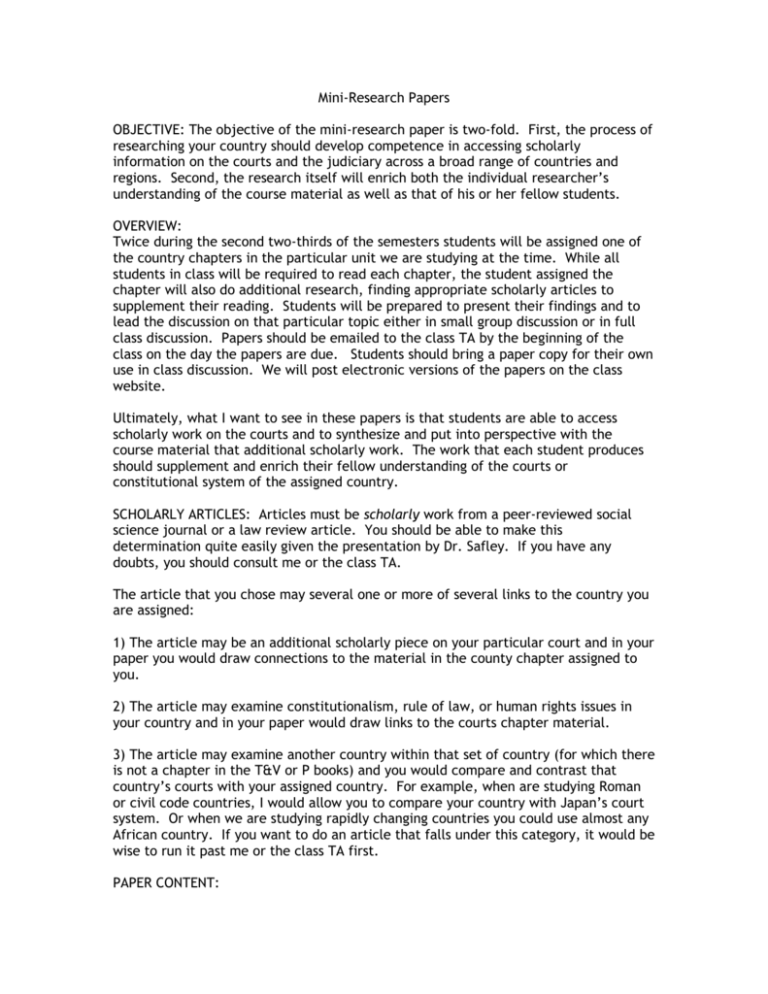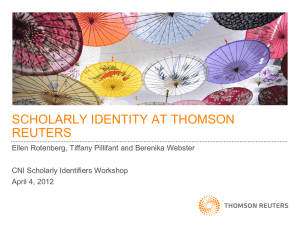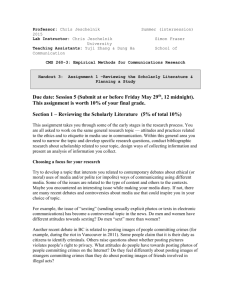Mini-Research Paper
advertisement

Mini-Research Papers OBJECTIVE: The objective of the mini-research paper is two-fold. First, the process of researching your country should develop competence in accessing scholarly information on the courts and the judiciary across a broad range of countries and regions. Second, the research itself will enrich both the individual researcher’s understanding of the course material as well as that of his or her fellow students. OVERVIEW: Twice during the second two-thirds of the semesters students will be assigned one of the country chapters in the particular unit we are studying at the time. While all students in class will be required to read each chapter, the student assigned the chapter will also do additional research, finding appropriate scholarly articles to supplement their reading. Students will be prepared to present their findings and to lead the discussion on that particular topic either in small group discussion or in full class discussion. Papers should be emailed to the class TA by the beginning of the class on the day the papers are due. Students should bring a paper copy for their own use in class discussion. We will post electronic versions of the papers on the class website. Ultimately, what I want to see in these papers is that students are able to access scholarly work on the courts and to synthesize and put into perspective with the course material that additional scholarly work. The work that each student produces should supplement and enrich their fellow understanding of the courts or constitutional system of the assigned country. SCHOLARLY ARTICLES: Articles must be scholarly work from a peer-reviewed social science journal or a law review article. You should be able to make this determination quite easily given the presentation by Dr. Safley. If you have any doubts, you should consult me or the class TA. The article that you chose may several one or more of several links to the country you are assigned: 1) The article may be an additional scholarly piece on your particular court and in your paper you would draw connections to the material in the county chapter assigned to you. 2) The article may examine constitutionalism, rule of law, or human rights issues in your country and in your paper would draw links to the courts chapter material. 3) The article may examine another country within that set of country (for which there is not a chapter in the T&V or P books) and you would compare and contrast that country’s courts with your assigned country. For example, when are studying Roman or civil code countries, I would allow you to compare your country with Japan’s court system. Or when we are studying rapidly changing countries you could use almost any African country. If you want to do an article that falls under this category, it would be wise to run it past me or the class TA first. PAPER CONTENT: PAPER FORMAT: The papers should be three to four pages long, single-spaced, 12point font, with one-inch margins. You should include a title page that contains your name, date and course info, the country and chapter assigned, and the full citation for the article you read. In the first half of the paper, you will summarize briefly the themes of your chapter, and more importantly, you will place that material within the context of the themes and theory we are examining the class. This part should be about one to one and a half pages. The second half should be slightly longer and should meet one the three objectives above. Remember, the papers will be posted electronically for other students to read! SUBMISSION PROCESS: You should email both me and the TA a copy of your paper by 3:30 pm on the date the papers are due. IN-CLASS DISCUSSION: In class as we cover the various country chapters students who have written the paper will be asked to lead discussion either in small groups or in the class generally, and students will be asked to informally present their particular findings. PAPER ONE: All students will be assigned one of the following countries from these two sets. 1) WESTERN COMMON-LAW DEMOCRACIES The United Kingdom, Australia and Canada 2) EUROPEAN ROMANO-GERMANIC DEMOCRACIES Italy, France, Germany, Sweden, the Netherlands and Israel PAPER TWO: All students will be assigned one of the following countries from these two sets. 1) LATIN AMERICA El Salvador, Brazil, Argentina, and Chile 2) RAPIDLY CHANGING NATIONS USSR, Philippines Namibia, Nigeria





